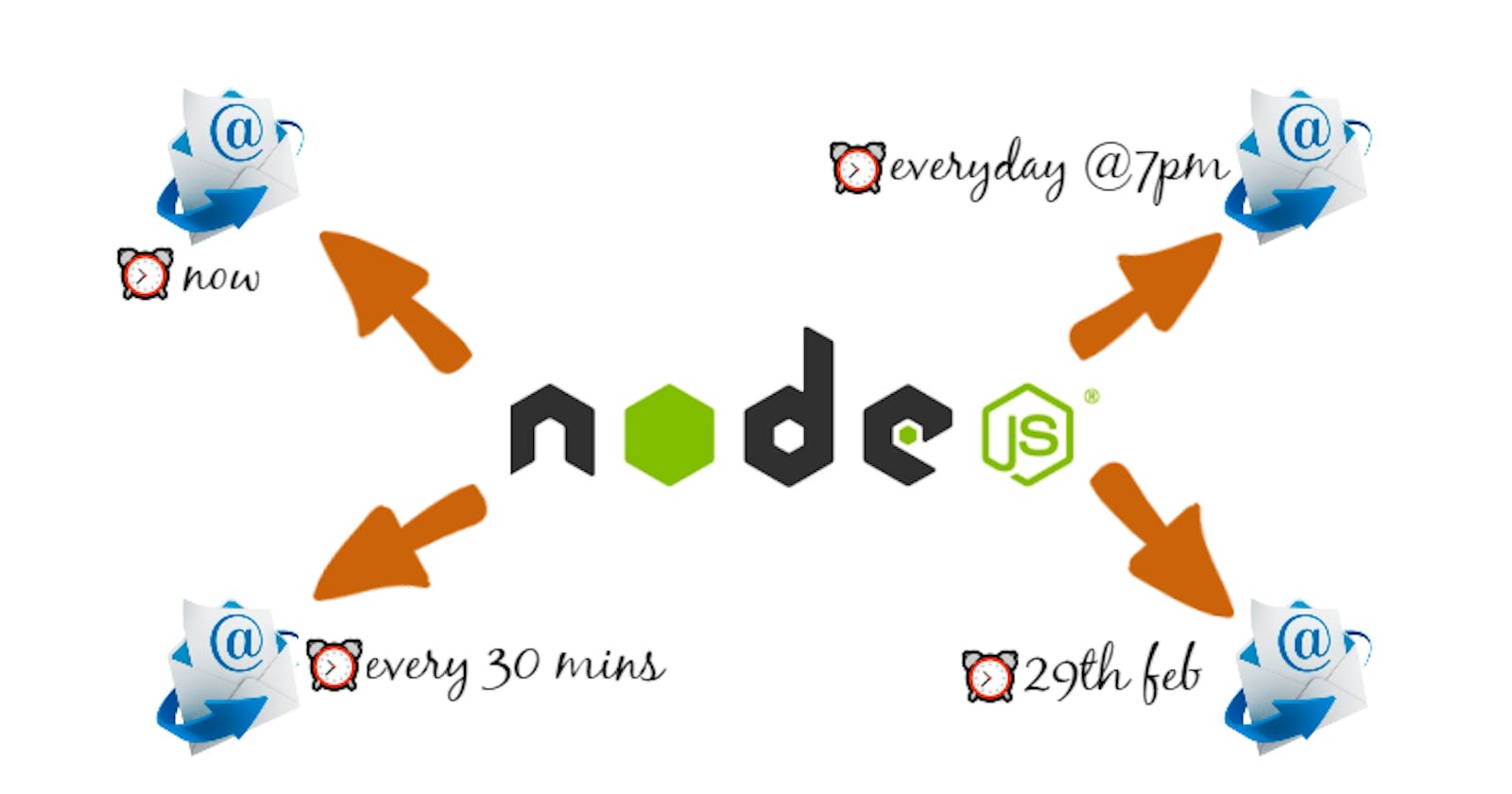As an application developer, how often do we sense the need for a service that would send e-mails to specified or subscribed email ids? Even if there is no real need, we still fantasize about it while developing a side-project or an app for fun, don't we 😁?
In this article, I will explain the simple steps to send emails from your node.js app. At the end of it, we will be able to schedule and send e-mails. Not only that, we will be creating a REST API to post required details to a node.js app for sending emails.
TL;DR
Here is the working app
 REST API to send e-mail from a node.js app
REST API to send e-mail from a node.js app
You can find the code from my GitHub Repo: Test REST app for Sending e-mails
Setting the stage
Nodemailer is a super cool module for the Node.js application to allow email sending so easily. Install it using npm
npm install nodemailer --save
Import Nodemailer in your .js(app.js, email.js whatever) file:
let nodemailer = require('nodemailer');
Next, follow these three simple steps to get things working:
Setup a message option: This is to tell
Nodemailerwho is sending what message to whom?let mailOptions = { from: '<FROM_EMAIL_ADDRESS>', to: '<TO_EMAIL_ADDRESS>', subject: 'Email from Node-App: A Test Message!', text: 'Some content to send' };👉 Note: The
toproperty above can have multiple email ids separated by commas(,).Create a
Nodemailertransporter using either SMTP(this is default) or some other transport mechanismlet transporter = nodemailer.createTransport({ service: 'gmail', auth: { user: '<FROM_EMAIL_ADDRESS>', pass: '<FROM_EMAIL_PASSWORD>' } });👉 Note: In the above example, we have mentioned the
serviceasgmail. It is just an example. You can specify the name of the e-mail services you want to use.Use the
sendMail()method of your previously created transporter to deliver the message.transporter.sendMail(mailOptions, function(error, info){ if (error) { console.log(error); } else { console.log('Email sent: ' + info.response); } });
That's all, and you are done. Now we have everything required to send e-mail from this node.js app.
Hang on a Minute. We can schedule it!
Yeah, right! The real power of this app comes with the fact that you will be able to schedule the emails like,
- Send now
- Send every day at 7 p.m. (19:00 hrs), like a daily-digest
- Send every 30 minutes.
- Send on 29th Feb!
- Many many more desired ways.
You guessed it right, we need something like a cron job, and for that, we will be using a node module called node-cron.
First install it.
node install node-cron --saveImport
node-cronand schedule a tasklet cron = require('node-cron'); cron.schedule('* * * * *', () => { console.log('running a task every minute'); });👉 Note: You can read about several cron schedule patterns here. In the above example, we have scheduled a simple console log in every minute.
Here is the combined code where I am scheduling the e-mail to send every minute:
let cron = require('node-cron');
let nodemailer = require('nodemailer');
// e-mail message options
let mailOptions = {
from: '<FROM_EMAIL_ADDRESS>',
to: '<TO_EMAIL_ADDRESS>',
subject: 'Email from Node-App: A Test Message!',
text: 'Some content to send'
};
// e-mail transport configuration
let transporter = nodemailer.createTransport({
service: 'gmail',
auth: {
user: '<FROM_EMAIL_ADDRESS>',
pass: '<FROM_EMAIL_PASSWORD>'
}
});
cron.schedule('* * * * *', () => {
// Send e-mail
transporter.sendMail(mailOptions, function(error, info){
if (error) {
console.log(error);
} else {
console.log('Email sent: ' + info.response);
}
});
});
TADAAA, Done!

REST API to Schedule and Send e-mail
It is an optional part for you if you are not interested in creating a REST API for Scheduling and Sending e-mails. In case your mind, we can do it in a minute using sails.js. I have posted an article on How to Deploy your Sails.js app on Heroku and live longer. Take a quick look.
- Create a route in the
routes.jsfile of your sails.js app'post /api/sendemail': 'EmailController.sendEmail' - Create an
EmailControllerwith thesendEmailmethod. This method should have the code discussed above for scheduling and sending emails.
Wow, that was quick.
👉 Note: With sails.js, you can also use other cron libraries like sails-hook-cron as well. You can find the details here.
Let me know if this was useful to you.
Please feel free to comment on the alternate ways and methods you may use to serve the same purpose, i.e., Scheduling and Sending e-mails from a node.js app. After all, Sharing is Caring....!! 😊😊😊
I hope you enjoyed this article or found it helpful. Let's connect. You can find me on Twitter(@tapasadhikary), sharing thoughts, tips, and code practices. Please hit the Subscribe button at the top of the page to get an email notification on my latest posts.

